Atlantic League (1998-2005)
Can-Am League (2006-2008)
Tombstone
Born: 1997 – Atlantic League founding franchise
Re-Branded: 2009 (American Defenders of New Hampshire)
First Game: May 21, 1998 (W 5-4 vs. Newburgh Black Diamonds)
Last Game: September 1, 2008 (W 7-6 @ Quebec Capitales)
Atlantic League Champions: 2000
Can-Am League Champions: 2007
Stadium
Holman Stadium (4,375)12001 Newark Bears Program
Opened: 1937
Ownership
Owners:
- 1998-2004: Chris English
- 2005: Frank Boulton, Peter Kirk & Steven Kalafer
- 2006-2008: John Stabile
Major League Affiliation: Independent
Trophy Case
Can-Am League Most Valuable Player
- 2007: Olmo Rosario
Attendance
Nashua Pride attendance records are now complete.
Tilting your mobile device may offer better viewing.
Sources:
- The Encyclopedia of Minor League Baseball (3rd ed.), Lloyd Johnson & Miles Wolff, 2007 (Pride & Atlantic League figures 1998-2005)
- 2017 Can-Am League Media Guide (Pride & Can-Am League figures 2006-2008)
Background
Nashua, New Hampshire has a fascinating but unsteady history with postwar baseball. In 1946, Branch Rickey placed a Class B Brooklyn Dodgers farm club in the city’s Holman Stadium. Rickey chose Nashua after his Danville, Iowa farm team refused to take on two promising African-American players, Don Newcombe and Roy Campanella.
The Nashua Dodgers would be the first racially integrated team of the modern era, one summer before Jackie Robinson arrived in Brooklyn. Nashua also featured a 34-year old first baseman named Walter Alston winding down an unremarkable minor league career. As player-manager, Alston led the Nashua Dodgers to the New England League title in 1946. He later won four World Series crowns as manager of the Brooklyn/Los Angeles Dodgers and joined Roy Campanella in the National Baseball Hall of Fame in 1983. For all that remarkable legacy, the Dodgers lasted only four seasons in Nashua, folding in 1949.
Baseball did not return until 1983, when George Como, Jerry Mileur and Ben Surner bought the Holyoke Millers double-A Eastern League club and moved it to town. After one season as a California Angels affiliate, Como and Surner signed on with the dreadful Pittsburgh Pirates. In May 1986 Nashua fans purchased only 150 advance tickets for a local exhibition game against the big club from Pittsburgh. Nashua officials cancelled the game due to lack of interest. Como and Mileur moved the club to Harrisburg, Pennsylvania that winter.
Independent Baseball
By the early 1990’s, Holman Stadium no longer met the improved standards required by the Professional Baseball Agreement, the set of commandments governing the partnership between Major League Baseball and its farm clubs. Like many small communities with charming but outmoded Works Progress Administration ballparks, Nashua had been shut out of affiliated ball. What arrived next were independent leagues, beginning with the low budget North Atlantic League in 1995. The Nashua Hawks took roost in Holman in 1995. A year later they were evicted by City officials in midseason over unpaid bills.
In late 1997, Chris English, a hedge fund manager from suburban Boston arrived in town representing the Atlantic League, a far more respectable and well-financed independent start-up whose investors were involved in major ballpark construction projects in Bridgeport, Long Island, Atlantic City, Newark and Bridgewater, New Jersey. The Nashua Pride would be an anomaly within the Atlantic League in many ways. The team was distant from the league’s original New York-Philadelphia axis. There would be no $30 million stadium project in Nashua. Instead, English and his General Manager Billy Johnson embarked on a renovation of Holman Stadium in late 1997. The upgrades included the installation of 2,800 box seats salvaged from the recently demolished Atlanta-Fulton County Stadium to replace the flat concrete slabs of Holman’s old grandstand.
The Pride averaged 1,581 fans over 57 home games on sales of approximately 250 season tickets during that first season in 1998. Former Major Leaguer Milt Cuyler began the 1998 season in Nashua before earning a September call-up to the Texas Rangers, helping to establish the Atlantic League as a worthy destination for ex-Big Leaguers.
Butch Hobson
The Nashua Pride hit their peak in the summer of 2000. English and Johnson hired former Red Sox star Butch Hobson as the club’s new field manager. Hobson was something of a cult figure in New England. The Alabama native played football for Bear Bryant before coming up with the Sox in 1976. The next season, Hobson hit 30 home runs batting primarily out of the #8 spot in the line-up, a virtually unheard of feat in the pre-steroid era. Sox fans tended to forgive Hobson’s erratic fielding (43 errors in 1978), knowing that he suffered from loose bone chips floating in his right elbow. He was known to manually adjust the painful chips between plays. Hobson only played three full seasons in the majors due to his injury problems, which added to the mystique of what might have been for the handsome cornerman.
Hobson later managed the Red Sox through three fallow seasons from 1992 to 1994. In 1996, Hobson, an admitted partier during his playing days turned born again Christian, was arrested in a cocaine sting while managing the Philadelphia Phillies triple-A farm club. Hobson refuted the charges, ultimately pleading no contest and performing community service. The incident may have derailed whatever opportunity he had to return to the Majors as a Manager. But Red Sox Nation never seemed to hold it against the popular slugger. He was greeted as a returning hero in Nashua during the summer of 2000.
Buoyed by a veteran roster stocked with former Major Leaguers such as Casey Candaele, Milt Cuyler, Sam Horn, Glenn Murray, John Roper, Ken Ryan, and others, the Pride won the 2000 Atlantic League Championship, sweeping the Somerset Patriots in four games. At the box office, the Pride drew 140,000 fans – an average of nearly 2,000 per game and an increase of 50,000 fans over the inaugural season two summers earlier.
In addition to a beloved manager and a winning team, the Pride also benefitted from the ever-growing notoriety of The World Famous Monkey Boy, a mischievous dancing mascot portrayed by the Pride’s ticket manager Chris Ames. Monkey Boy arguably rivaled Hobson in local popularity during the 2000 season. Ames would ultimately take the character on the road as a national touring act that continued for years after he left the Pride in late 2000.
English commissioned a documentary film crew to chronicle his ball club during the 2000 season. 81-year old Curt Gowdy provided the voice over narration. Negotiations to sell a rawer version of the documentary to pay cable and Japanese broadcasting interests came to naught. So the club released a (mostly) family-friendly 58-minute edit in the spring of 2001 under the title Stolen Bases.
The film owed its title to a central scene where Hobson, upon being ejected, ripped a base out of the ground, autographed it and handed it to a kid in the Holman Stadium grandstand on his way off the field. Stolen Bases had two private screenings in Nashua. It was briefly available for mail order purchase through Baseball America paired with a Butch Hobson Bobble Head doll. By the end of the summer, most of 500 or so VHS cassettes the team initially ordered resided in a dank storage closet behind the Holman Stadium men’s room. Which was a shame … the movie was pretty good:
In 2001, with Pride attendance on the upswing, the City of Nashua approved $4.5 million in upgrades to Holman Stadium. The improvements included a new steel second level with luxury suites and expanded press box, 2,800 new chairback seats, and new administrative, retail and box office space. The renovations were completed in time for the 2002 season, but the season seemed cursed from the outset. Manager Butch Hobson missed time in June for an angioplasty. On July 4th, 2002 the Pride embarked on a 21-game losing streak, the third longest in minor league history at the time. Attendance declined for the second straight year to 120,960, from the 2000 peak of 140,000.
In early 2003, the Toronto Blue Jays double-A affiliate in New Haven, Connecticut announced plans to relocate to Manchester, New Hampshire for the 2004 season. The Pride would now face competition from Major League-subsidized farm clubs located both 15 minutes to the north (Manchester) and fifteen minutes to the south (Lowell Spinners) along the Route 3 corridor. At the end of the 2004 season, Chris English threw in the towel after seven seasons of operating in the red.
English handed the reigns to BKK Nashua, LLC, a consortium of fellow Atlantic League owners including league founder Frank Boulton (the “B” in BKK), Peter Kirk (“K”) and Steve Kalafer (“K”). With English’s departure, the BKK trio effectively controlled seven of the eight Atlantic League clubs, excluding only Mickey Herbert’s Bridgeport Bluefish franchise. League founder and CEO Boulton owned the immensely profitable Long Island Ducks and also controlled the Atlantic City Surf franchise. Kalafer, like Boulton, owned one wildly successful club (the Somerset Patriots) and one troublesome one (the Newark Bears). Kirk, a highly respected operator with a long track record in affiliated ball, had two Pennsylvania-based Atlanic League expansion teams preparing to debut in gleaming new stadiums under construction in Lancaster (2005) and York (2006). And collectively, the BKK trio had stepped in to purchase the Camden Riversharks club earlier in 2004 after its founder died suddenly .
In 2005, the Nashua Pride returned to the Atlantic League Championship Series for the third time in Hobson’s six years at the helm. And for the third time, they would face their arch rivals, Sparky Lyle’s Somerset Patriots. The Patriots swept the Pride this time around, 3 games to zero. Off the field, the 2005 season was difficult, as the opening of the New Hampshire Fisher Cats new stadium in nearby Manchester and budget reductions combined to reduce the Pride’s announced attendance to an all-time low of just 1,270 per game.
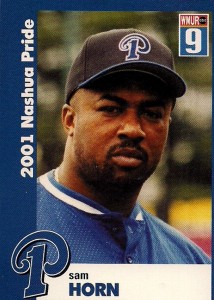 In the fall of 2005, Frank Boulton arranged a sale of the Pride to local real estate developer John Stabile and engineered the Pride’s transfer to the Can-Am League. The Can-Am League was another Northeast-based independent loop with cities stretching from New Jersey to Quebec City. Nashua became the first of several struggling Atlantic League franchises to be relegated to the lower-budget Can-Am League. Atlantic City and Newark would follow in subsequent years. The sale of the Pride to Stabile put the franchise in local hands for the first time after eight seasons.
In the fall of 2005, Frank Boulton arranged a sale of the Pride to local real estate developer John Stabile and engineered the Pride’s transfer to the Can-Am League. The Can-Am League was another Northeast-based independent loop with cities stretching from New Jersey to Quebec City. Nashua became the first of several struggling Atlantic League franchises to be relegated to the lower-budget Can-Am League. Atlantic City and Newark would follow in subsequent years. The sale of the Pride to Stabile put the franchise in local hands for the first time after eight seasons.
With the jump to the Can-Am League in 2006, the era of recognizable stars in Nashua came to an end. Between 1998 and 2005, former Major League All-Stars Dante Bichette, Pete Incaviglia, Lance Johnson, Felix Jose suited up for the Pride as did 1989 National League Rookie-of-the Year Jerome Walton. Closer Mel Rojas signed a $13.75 million dollar contract with the Chicago Cubs in 1996, but earned just $3,000/month to pitch for the Pride in 2002.
The Atlantic League-era Pride also sent several players up to the Major Leagues. The most noteworthy was the future Anaheim Angels All-Star Brendan Donnelly. The right-handed reliever pitched for the Pride in 1999 and made his Major League debut with the Angels at age 30 in 2002. He went on to win a World Series with Anaheim in 2002 and was the winning pitcher in Major League Baseball’s All-Star Game in 2003.
The Pride lasted three years in the Can-Am League, winning a league title in 2007. Community enthusiasm and attendance rebounded somewhat under the Stabile family’s ownership, but the team continued to run deficits of several hundred thousands dollars annually. Hobson finally departed after the 2007 season to return to the Atlantic League with Peter Kirk’s Southern Maryland Blue Crabs.
Demise & Aftermath
The Pride lasted one final summer without Butch. Stabile sold the team in late 2008 to Boston Baseball All-Stars LLC, a weird outfit that re-branded the team as a jingo-istic, flag-humping
In 2011, stable ownership returned when Lowell Spinners owner Drew Weber formed the Nashua Silver Knights, a collegiate wooden bat league team. In a nod to the Pride’s glory day, the Silver Knights booked a return engagement from the World Famous Monkey Boy, which ended abruptly and bizarrely when Chris Ames was assaulted by a member of the opposing Martha’s Vineyard Sharks. The Silver Knights also held a Nashua Pride reunion night in 2012. The game attracted former Major Leaguers and long-time Pride stars Glenn Murray and John Roper, along with former owner Chris English.
Voices
“Nashua’s a funny town. I think the first sign of trouble was at a Chamber of Commerce meeting and [our GM] Billy Johnson was talking about how we would be hiring all these fan-friendly, smiling staff to welcome fans and someone asked “Where are you gonna find them?
“But while the C.A.V.E. people [Citizens Against Virtually Everything] were loud, my experience with the rest of the people of Nashua was really pretty positive. At the end of the day, the Pride brought a lot of joy to those in the community who valued it – it just wasn’t a big enough market, squeezed between Lowell, Massachusetts and Manchester.”
– Chris English, Owner 1998-2004 (2011 FWiL Interview)
Downloads
Scorebook for Nashua’s Greatest Game. Down to their final strike of the season, James Lofton’s miraculous walk-off two-run homer at Holman lifts the Pride over the Bridgeport Bluefish and into the 2003 Atlantic League championship series.
9-18-2003 Nashua Pride vs Bridgeport Bluefish Score Sheet
2011 FWiL Interview with Pride Owner Chris English
2011 FWiL Interview with Chris Ames, AKA The World Famous Monkey Boy
Links
##

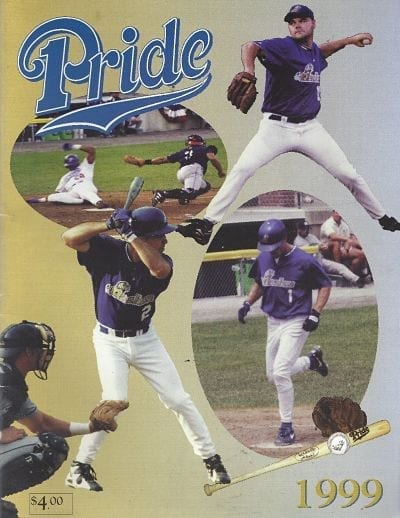
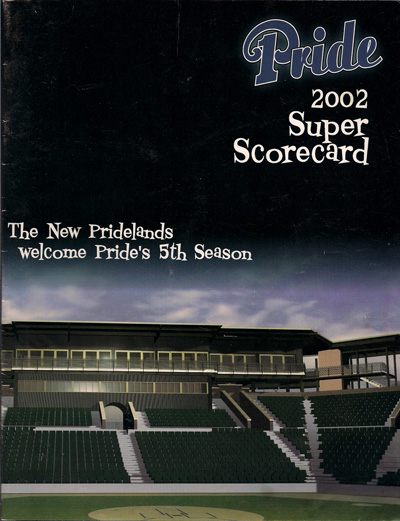
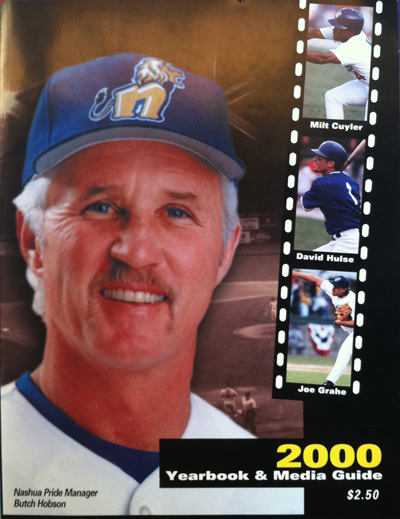
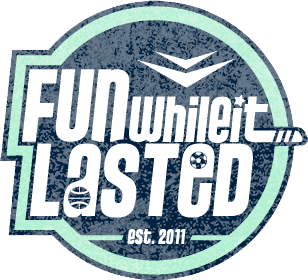
9 Responses
The Nashua Dodgers would be the first racially integrated team of the modern era, one summer before Jackie Robinson arrived in Brooklyn
Mmm, Didn’t Jackie Robinson play with the Montreal Royals of thr IL before playing with Brooklyn?
Yes – Robinson debuted for the Montreal Royals in the same summer of 1946. You can put my wording down to me being an arrogant American and ignoring Canada (as we so often do).
I’m willing to forgive this slight oversight.
I just stumbled on your blog, and I think i’m going to keep reading it.
Wow, I didn’t know about the American Defenders mascot or the Lee Greenwood interruption. That is unbelievably tacky. Not as tacky as not paying the police and fire department though.
Butch just did the base-stealing trick again, this time with the Chicago Dogs of the American Association.
https://www.al.com/sports/index.ssf/2018/08/watch_butch_hobson_give_away_t.html
I am looking for info on a nashua pride championship ring in a 3 inch cube. 2008 i believe. is this collectable or worth anything.
I have a 2000 ring from intergold in acrylic block. Just wondering if any collectors out there